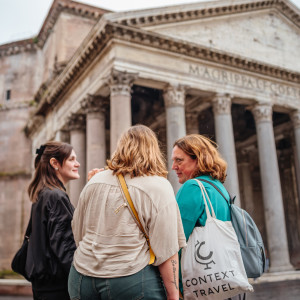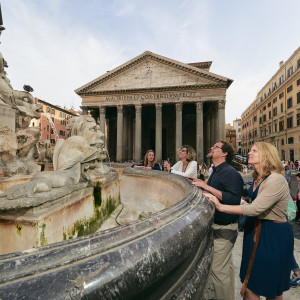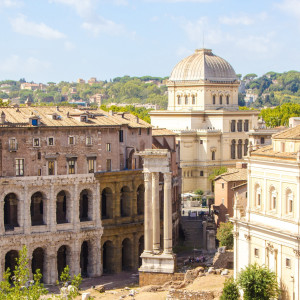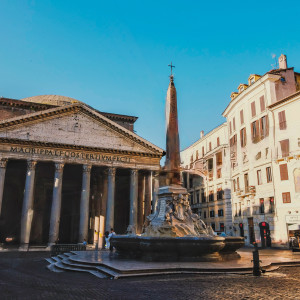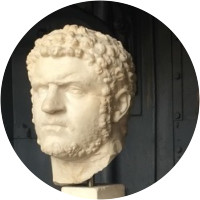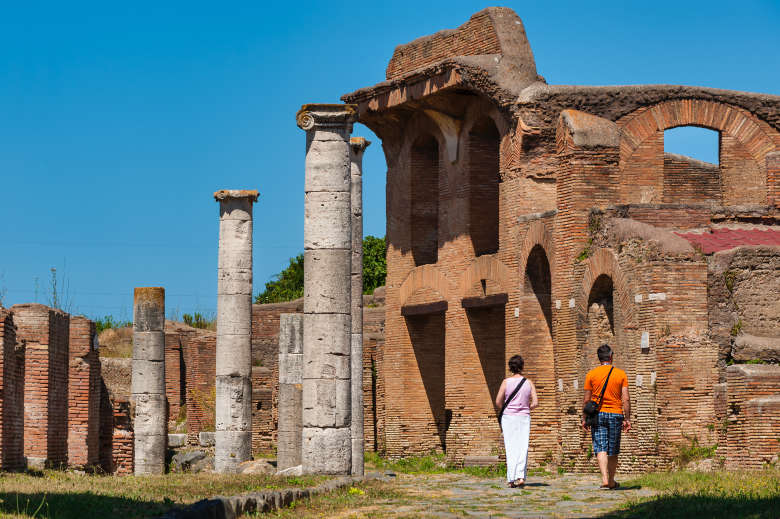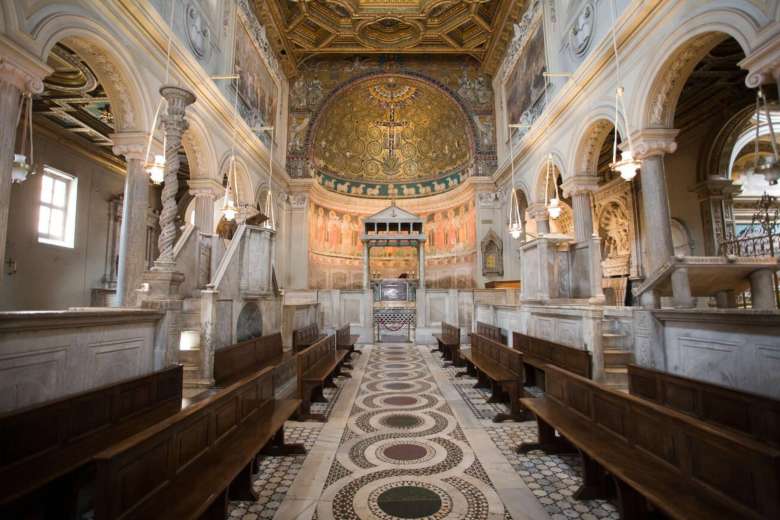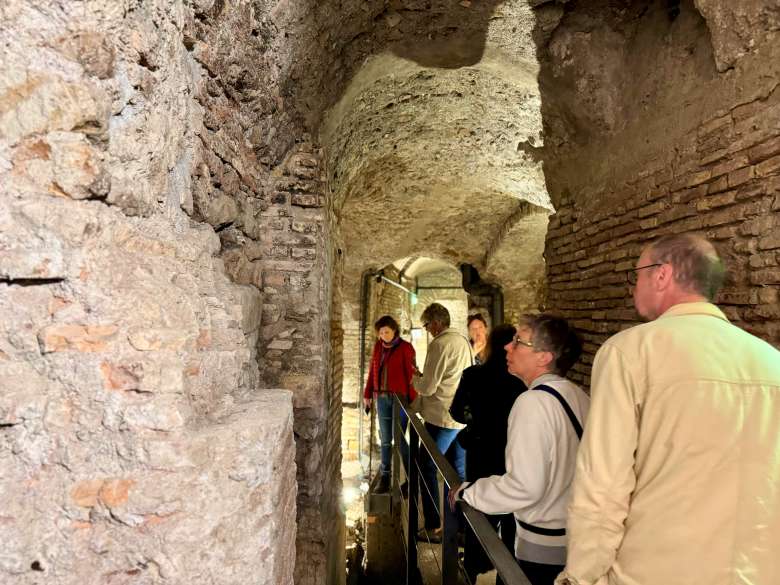Tour Details
Duration
3 hours
Product Type
Tour
Venues
- Pantheon
- Largo di Torre Argentina
- Portico D'ottavia
- Mausoleo di Augusto
- Teatro di Marcello
Photos & Highlights
- Experience Roman history through compelling narratives that make centuries of emperors, gladiators, and political intrigue feel like the world's most captivating drama.
- Unforgettable insights await: imperial showmanship, gladiator fame, and the engineering marvels that made impossible spectacles possible.
Select a date
Tour Description
With the death of Julius Caesar in 44 BCE, Rome entered a period of political upheaval settled only when Caesar's nephew Octavian defeated Mark Antony and Cleopatra, took control of the Empire, and claimed the title of Caesar Augustus. This is what the history books have told you. In this three-hour Ancient Rome tour, you’ll go beyond the history books, setting foot where this narrative took place: places of power and legacy like the Pantheon, the Theater of Marcellus, and Largo Argentina.
An eagle carved into acanthus leaves? Not just decoration, but Augustus claiming divine approval. A Greek column order on a Roman monument? Proof that Rome styled itself as Greece’s heir, not just its conqueror. Your guide, who is an experienced archeologist or classicist, has excavated and studied these very sites throughout their career, and with you, they will look closely at this period and how the ancient rulers and first emperors have used monuments as deliberate instruments to shape memory and project their power, often in ways not unlike modern politics and propaganda. This tour isn’t a checklist of monuments: it’s a chance to decode how emperors crafted their image, and how the city itself became their stage.
Choose this tour if…
- You’re well-versed in ancient history and want a guide who matches your passion and can fuel your curiosity, while letting your travel companions enjoy the tour too.
- You want scholarship delivered with storytelling: learn insights from a true expert, but still have fun and enjoy your vacation.
- You love theory but crave reality: move beyond the textbook and experience the architectural details firsthand.
- You’ve ticked off the famous monuments and now want insider insights into Ancient Rome without the months of prep and reading it usually takes.
Experts
You will begin at the Theater of Marcellus, originally conceived by Julius Caesar as a statement of prestige in his war of status with Pompey, but built by his nephew Augustus after his death. As one of the largest Roman theaters still standing and an amazing testament to Rome's ability to adapt and reuse its buildings throughout history, we'll use this monument as a jumping-off point to lay the groundwork of our time together.
The path will follow, roughly, a kind of monumental way envisioned by Augustus when remaking the old Field of Mars into a new center for the city. You'll pass many of the structures that played a key role in this, including the Pantheon, regarded during the Renaissance as the most perfect building in the world. You'll also pass the site where Julius Caesar was murdered on the Ides of March.
The tour will end in the vicinity of the Ara Pacis, the modern museum built around the great altar of peace commissioned by Augustus to signal the Pax Romana, or period of relatively uninterrupted peace, ushered in by Augustus and lasting over a hundred years. In the shadow of Augustus' own mausoleum, you'll discuss the legacy of the Caesars, both real and imagined, and how successive rulers down to the Fascists of the 20th century drew on the narrative of Julius and Augustus Caesar to validate their own rule. You'll emerge with a new sense of Rome and its relevance to issues today.
Sites Visited
- Pantheon
- Theater of Marcellus
- Largo Argentina
- Museum of the Ara Pacis
Tickets
You are prepaid for the tour, and the tickets for the Pantheon. Note that there might be other expenses not included in the price of the tour, like little cash payments or donations to visit certain venues. It is a good idea to have some local cash with you if that’s the case.
Accessibility
We understand that some of our valued guests may have mobility concerns, and we want to ensure you have a comfortable and enjoyable experience throughout your tour. If there are any accessibility concerns that your tour guide will need to be aware of, please let our team know at the time of booking.
Wheelchair accessibility
This tour is not the best for clients with mobility issues. Although the tour pace isn't too strenuous and no hills are involved, the area has lots of cobblestones and clients need to be on their feet for most of the tour, there are not many opportunities to sit.
Do I need to know a lot about history or archeology to take this tour?
Not at all! This tour is designed for all levels of experience. Whether you’re a seasoned history buff or simply curious about ancient Rome, your guide will tailor the experience to be engaging and insightful for everyone.
Is this tour good for children?
This tour is not part of our family program, which is designed specifically to engage younger learners. For a family-friendly option, we recommend our Colosseum and Roman Forum tour for families. While younger children are welcome, please note that some of the topics on this tour may be less engaging for them.
Does this tour focus on Julius Caesar?
No, while this tour covers a bit of Julius Caesar's life, its main focus with the venues on this tour is the rebuilding of imperial Rome right after his death. The tour focuses on the legacy of the Caesars, with many of the venues being tied to Augustus' contributions to Rome.
Are tickets included on this tour?
Yes! It is now required to purchase tickets in order to enter the Pantheon. Context will pre-purchase these tickets in anticipation of your tour.
Does this tour visit sites with a dress code?
Yes, it usually visits the Pantheon, which is considered a holy place. Men should wear slacks, and women should wear slacks or skirts below the knee. Shoulders must also be covered. If you are intent on wearing spaghetti straps or a halter-top, bring a shawl and expect to keep it around you. Shorts above the knee are not allowed. These rules may seem unduly strict, but remember, the Pantheon is also a church so the same dress code standards apply.
Do you reserve headsets for this tour?
Depending on your group size, we may be required by the venue to order headsets in which case you’ll see a “Headset Fee” added to your order. If you would like to guarantee headsets for your tour regardless of your group size, please email us and we’ll be happy to get them reserved for you.
Book with confidence — see Context's flexible cancellation policy here.
Where You'll Start
–
234 Reviews
Reviews can only be left by Context customers after they have completed a tour. For more information about our reviews, please see our FAQ.
Liz was fantastic! She brought Ancient Rome to life and with her enthusiasm and colorful anecdotes, made learning about Ancient Rome both fun and enlightening.
Tracy
Reviewed on:
Sep 19, 2025
A Journey Through Time with Rome's Indiana Jones
Having Demosthenes as a guide is like having your own personal Indiana Jones, except instead of hunting artifacts, he's already found them and can tell you their deepest secrets. Our journey began at the Teatro di Marcello, where his PhD expertise on Republican temple architecture immediately transformed weathered stones into a vivid political drama. As he explained how Augustus completed his uncle Julius's ambitious project, Demosthenes pointed to specific architectural elements he'd studied during excavations, showing us how each design choice was calculated to project power. His hands moved with the precision of someone who has measured these very stones, bringing academic theory into tangible reality. When we made an unexpected detour through the Jewish Ghetto, he seamlessly connected ancient Rome's multicultural reality to its modern neighborhoods, explaining how Jewish communities had thrived here since Republican times—insights that came not from guidebooks but from years of studying Rome's layered history.
Within the neighborhood, he also pointed to a Roman Corinthian Column. "See that Corinthian column?" he asked, directing our attention to an eagle carved among the acanthus leaves. "That's not just decoration—it's Augustus claiming divine approval."
What truly sets Demosthenes apart is his ability to weave profound scholarly insights with accessible storytelling. His passion intensified as he described the paradox we Greeks know so well: "Rome conquered Greece with its legions, but Greece conquered Rome with its culture." He showed us how Roman architects borrowed Greek orders, how Latin literature imitated Greek forms, and how Roman emperors desperately wanted to be seen as philhellenes. At the Pantheon, he captured our teenagers' imagination while simultaneously engaging us professors in doctoral-level discussions about imperial history, philosophy, and religion (We will never forget the likely apocryphal story of Margarita!) "The Romans gave us the word 'mausoleum,'" he said with a knowing smile, "but it comes from Mausolus, a Greek ruler in Asia Minor. Even their monuments to power have Greek roots." This wasn't just information delivery—it was a masterful performance that made ancient stones speak across millennia.
Our tour culminated at Augustus's mausoleum, where Demosthenes' personal connection to the site electrified the experience. "I spent months here," he said quietly, "carefully excavating layers of history." Standing before the massive tomb where he had personally worked, he posed questions that still haunt us: How do leaders use monuments to shape memory? What does it mean that these ruins still dominate Rome's landscape? Why did Augustus, the most powerful Roman, choose a tomb design that echoed Greek traditions? As we left, my daughter asked, "So did Rome really win if they ended up thinking like Greeks?" Demosthenes smiled and replied, "That's a question scholars have debated for two thousand years." Twenty-four hours later, we're still discussing his insights over dinner, seeing Rome not as a conqueror of Greece but as its greatest student. This wasn't just the best tour we've taken—it was a transformative experience that fundamentally changed how we understand the ancient world. Ευχαριστώ, Demosthenes, for sharing your profound knowledge and infectious enthusiasm. Rome will never look the same to us again.
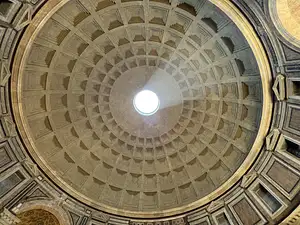
Angelo
Reviewed on:
Sep 3, 2025
Frank is a true expert and enthusiastically shared his knowledge to make it a delightful and rewarding experience. Bravo!
Thomas
Reviewed on:
Aug 16, 2025
